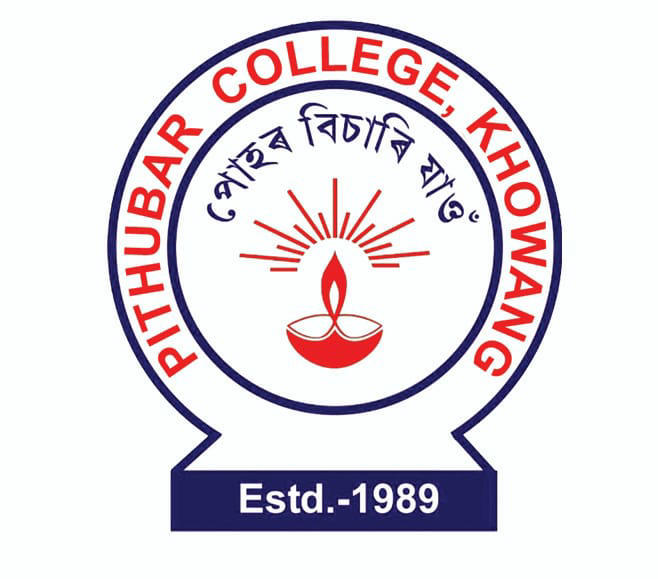
- pithubarcollegekhowang@gmail.com
- Call Us: +91-9957246160

- pithubarcollegekhowang@gmail.com
- +91-9957246160


Department of History : At a Glance
The Department of History is one of the very first department which was opened with the establishment of Pithubar Girls’ degree College on 9th August 1989. The Department Provides both Major and Non Major Course in the Under Graduate Semester Level, following by the syllabus provided by Dibrugarh University . At present the department has more than 40 (forty) major student in the Semester Classes. The Department has maintained a book corner consisting of Textbook, Reference Book etc. Many students after securing good results in the final examination under Dibrugarh University have been engaged in different field.
Academic Activities :
The Faculty Members of the department are very much conscious for the intellectual and acadmic development of the students. To increase intellectual creativity among the students, history Department has opened a well decorated Wall Magazine named “GYANBIKHA” . Every year the department has organized excursion to different historical important places such as Charaideo, Majuli, Azan-Pir- Dargha of Saraguri Chapori to acquaint with the students to reflect on nature of interaction between the past and the present.

Qualification: MA
Designation: Assistant Professor
Department: History
9954741110
Qualification: MA.MPhil,SET,BEd,
Designation: Assistant Professor
Department: History
9954560969
Qualification: MA
Designation: Assistant Professor
Department: History
9101986359
Qualification: MA, SLET
Designation: Asst. Prof. & HoD
Department: History
8638117241Program Specific Outcomes
(PSO of B.A. History)
(a) Draw historical maps, charts, diagrams etc.
(b) Prepare historical models, tools etc.
(a) Collect ancient arts, old coins and other historical materials
(b) Participate in historical drama and historical occasions
(c) Visit places of historical interests, archaeological sites, museums and archives
(d) Read historical documents, maps, charts etc.
(e) Play active roles in activities of the historical organizations and associations
(f) Write articles on historical topics.
Course Outcomes (Cos)
(A) BA History (Core)
Semester 1:
CO 1: HISTORY OF INDIA- I
Course Code: HISHC101
Objectives: The objective of this course is to analyze the various source materials for the reconstruction of Ancient Indian History and the approaches of historical reconstruction.
Outcome: After completing the course, the students will be acquainted with the various ancient cultures, the technological, economic, political and religious development of the period concerned.
CO2: SOCIAL FORMATIONS AND CULTURAL PATTERNS OF THE ANCIENT WORLD
Course Code: HISHC102
Objectives: The students will acquainted with the evolution of humankind, the beginning of food production, the Bronze Age., advent of iron, the slave society in ancient Greece, the economy and the Political culture of the ancient Greece.
Outcome: After completing the course the students shall be able to know and learn the history of evolution of human being and gradual settlement as well as the culture of Greece.
Semester 2:
CO3: HISTORY OF INDIA II
Course Code: HISHC103
Objectives: The objective of this course is to acquaint the students with agrarian economy, the growth of urban centres in northern and central India and the Deccan as well as craft production, trade routes and coinage.
Outcome: Students shall be able to understand the process of state formation and the Mauryan and post-Mauryan polities with special reference to the Kushanas, Satavahanas and Gana-Sanghas.
Land grants, land rights and peasantry, urban decline and religious traditions of early India.
CO4: SOCIAL FORMATIONS AND CULTURAL PATTERNS OF THE MEDIEVAL WORLD
Course Code: HISHC104
Objectives: The learners will be acquainted with the Roman Empire, slave society, the cultural and trade. The learners will be acquainted with the crisis and disintegration of the Roman Empire.
Outcome: Students will understand the history of Roman empire as well as able to know the economic development in Europe from 7th to 14th centuries covering production, technological developments, growth of towns and trade and feudal crisis.
Semester 3
Co5: HISTORY OF INDIA III (c. 750 -1206)
Course Code: HISHC105
Objectives:
The students will acquire knowledge about the sources for the reconstruction of early medieval Indian history.
Outcome: After the completion of the course students shall be able to gain knowledge regarding political structure and social and religious institutions, the agrarian structure and social change, and about trade and commerce, guilds and process of urbanization.
Co6: RISE OF THE MODERN WEST – I
Course Code: HISHC106
Objectives: The students will be acquainted with the transition from feudalism to capitalism, the voyages to the new world, the Renaissance.
Outcome: After the completion of the course students shall be able to know the Religious Reformation, the 16th century Economic Developments and the emergence of European state system.
Co7: HISTORY OF INDIA IV (c.1206 – 1550)
Course Code: HISHC107
Objectives: The learners will gather information regarding
(i) The sources, vernacular histories and epigraphy
(ii) The various dynasties ruling Delhi
(iii) Emergence of Bahmani kingdom and Vijaynagara Empire
Outcome: After the completion of the course students shall be able to know the social and economic developments, the religion, society and culture during the late medieval India.
Semester 4
CO8: RISE OF THE MODERN WEST – II
Course Code: HISHC108
Objectives: This paper will help the students to know about the 17th century European crisis, the English Revolution.
Outcomes: After the completion of the course students shall be able to know scientific development from 15th to 17th century, growth of mercantilism end of Absolute Monarchy and growth of Parliamentary Democracy, the American and Industrial Revolution.
CO9: HISTORY OF INDIA V (c. 1550 – 1605)
Course Code: HISHC109
Objectives: The students will have information regarding the Persian sources and vernacular literary traditions.
Outcomes: After the completion of the course students shall be able to know the growth and consolidation of the Mughal Empire Mughal policies in the North West Frontier and the Deccan, the land rights and revenue system, agriculture, trade under the Mughals Political and religious ideas of the period concerned.
CO10: HISTORY OF INDIA VI (c. 1605 – 1750)
Course Code: HISHC1010
Objectives: The learners will have an idea about the various sources and historiography of the Mughal period.
Outcomes: After the completion of the course students shall be able to know expansion of the Mughal rule, the Sufi orders Auragzeb’s religious policy, religious institutions, decline of the Mughal Empire, growth of regional polities and state formation under the Rajputs, the Marathas, 18th Century Debate, trade, craft, monetary and market system, urban centres and Indian Ocean trade network
Semester 5
CO11: HISTORY OF Modern Europe – I (c. 1780 – 1939)
Course Code: HISHC1011
Objectives: The objective of this course is to help the students to be acquainted with the various factors that led to the French Revolution of 1789 The Art and Culture of the Revolution.
Outcome: After the completion of the course students shall be able to know the Restoration of royal dynasties, the radical movements, the evolution of social classes, Industrialization, the First World War and Administrative Reorganization in Italy and Germany.
CO12: HISTORY OF INDIA VII (c. 1750 – 1857)
Course Code: HISHC1012
Objectives:
The Paper tries to examine the transition of India into a Colonial domain of the British.
Outcomes: After the completion of the course students shall be able to know that this transition was not unilinear as the Colonial state had to face resistance from the natives.
Semester 6
CO13: HISTORY OF INDIA VIII (c. 1857 – 1950)
Course Code: HISHC1013
Objectives: The paper will endeavour to highlight the growth of Indian Nationalism and the National Movement for Freedom.
Outcomes: After the completion of the course students shall be able to know that the responses of the various sections of the people. They will also know the initial transition from the Colonial to the Post-Colonial era.
CO14: HISTORY OF MODERN EUROPE II (c. 1780 -1939)
Course Code: HISHC1014
Objectives: The Objective of this Course is to acquaint the Students with Liberal Democracy, Working Class Movements and Socialism in the 19th and 20th Centuries.
Outcomes: After the completion of the course students shall be able to know the crisis of Feudalism in Russia and Experiments in Socialism, War and Crisis: c. 1880-1939 and Post 1919 political development, Cultural and Intellectual Developments since c. 1850.
(B) BA History Generic Elective (Interdisciplinary Any Four)
Semester 1
CO1: HISTORY OF ASSAM: 1228 –1826
Objectives: The objective of this paper is to give a general outline of the history of Assam from the 13th century to the occupation of Assam by the English East India Company in the first quarter of the 19th century.
Outcomes: After the completion of the course students shall be able to know the major stages of developments in the political, social and cultural history of the state during the most important formative period.
Semester 2
CO2: HISTORY OF INDIA FROM THE EARLIEST TIMES TO 1526
Objectives: The objective of this paper is to acquaint the students with the general outline of the history of India from the known earliest times to the coming of the Mughals to India in the first quarter of the 16th century.
Outcomes: After the completion of the course students shall be able to get a comprehensive idea of the developments in all spheres of life during this period.
Semester 3
CO3: HISTORY OF INDIA: 1526 – 1947
Objectives: This paper aims to acquaint the students with the general course of events in the field of political, social, cultural and economic affairs in India from the foundation of the Mughal Empire in 1526 till Independence in 1947.
Outcomes: After the completion of the course students shall be able to know Political Conditions in Northern India in the beginning of the 16th century, British Conquests of India –British occupation of Bengal, Anglo-French rivalry-the Battle of Plassey and its effects.
Semester 4 (any one)
HISGE 4.1: HISTORY OF EUROPE: 1453-1815
Objectives: The objective of this paper is to acquaint the students with the major developments in European politico-economic scenario since the Renaissance till the end of the French Revolution.
Outcome: After the completion of the course students shall be able to know renaissance, reformation, thirty years war and colonial expansion.
HISGE 4.2: History of Modern Assam (1826-1947)
Objectives: This course intends to acquaint the students with Assam History from Yandaboo treaty to India’s Independence.
Outcome: After the completion of the course students shall be able to familiarize with political condition in Assam on the eve of the British rule. It also attempts to bring the pupils to the understanding of the social and economic conflicts like Peasant uprising and role of Assam in freedom struggle.
(C) BA History Discipline Specific Elective
Semester 5
CO1: EARLY AND MEDIEVAL ASSAM TILL 1826
Objectives: The objective of this paper is to give a general outline of the history of Assam from the 13th century to the occupation of Assam by the English East India Company
Outcome: After the completion of the course students shall be able to acquaint with major stages of developments in the political, social and cultural history of the state during the most important formative period.
CO2: HISTORY OF MODERN ASSAM: 1826 –1947
Objectives: The course aims at acquainting the students with the socio-political and economic developments in Assam.
Outcome: After the completion of the course students shall be able to understand the growth of Nationalism and the role of the Provinces in the National Movement for independence.
Semester 6 (Any Two)
CO3: Social and Economic History of Assam
Objectives: The objective of this course is to acquaint the students with the development of Caste, Social Classes and Occupational Groups in Ancient Assam, the religion Beliefs and Practice.
Outcome: After the completion of the course students shall be able to understand land grant, trade, Society, the Neo-Vaishnavite Movement Patriarchy, Satra Institutions, Agriculture and Trade in Medieval Assam, the Growth of Modern Education and role of the Missionaries, Middle Class, Agriculture, Tea Industry and Transport System in Colonial Assam.
CO4: Historiography
Objectives: This course aims to introduce the learners to important issues related to historical method including significant, historical trends and issues related with the historians craft.
Outcome: After the completion of the course students shall be able to understand Evolution of Historiography, Renaissance to Enlightenment Historiography and Development of History Writing in India in Modern Period.
CO5: HISTORY OF THE UNITED STATES OF AMERICA (c.1776-1945)
Objectives: This Course will give an account of the Colonization and Settlement of America.
Outcome: After the completion of the course students shall be able to understand the American War of Independence , the Features of Constitution, the rule of Federalists and Republicans, Monroe Doctrine, the Civil War, Industrialization, Labour Movements, USA in World War I and II.
(D) Ability Enhancement Course (AEC) (Any Two, Two Credits)
CO1: Museums and Archives in India
Objectives: It is an introductory course and aims to familiarize students with various aspects of museums and archives. The purpose of this course is to introduce, examine and understand the major concepts, principles, functions and operations in the field of museums and archives.
Outcome: It will enable students to understand its overall development as well as theoretical issues and principles of their management, administration and practical application. The course will help students to gain practical experience and will be project based.
CO2: Oral History
Objectives: The purpose of this course is to introduce students to the theories, methods and ethics of oral history and its significance to the historical literature.
Outcome: After the completion of the course students shall be able to understand the tools available for history writing beyond static sources.
CO3: Tourism in Assam
Objectives: Chief aim is to understand the tourism potentiality of Assam.
Outcome: After the completion of the course students shall be able to understand that tourism industry has occupied an important place in the globalised world economy. In Indian Context, Assam has great potentiality for tourism due to its geographical and ethnological diversities.
(E) Skill Enhancement Courses (SEC) (Any Two, Two Credits)
CO1: Museums and Archives in India
Objectives: To understand the major concepts, principles, functions and operations in the field of museums and archives.
Outcome: After the completion of the course students shall be able to understand its overall development as well as theoretical issues and principles of their management, administration and practical application. The course will help students to gain practical experience and will be project based.
CO2: Oral History
Objectives: The purpose of this course is to introduce students to the theories, methods and ethics of oral history and its significance to the historical literature.
Outcome: After the completion of the course students shall be able to understand the tools available for history writing beyond static sources.
CO3: Tourism in Assam
Objectives: The chief aim is to understand the tourism potentiality of Assam.
Outcome: After the completion of the course students shall be able to understand that tourism industry has occupied an important place in the globalised world economy. In Indian Context, Assam has great potentiality for tourism due to its geographical and ethnological diversities.
Department of History : At a Glance
The Department of History is one of the very first department which was opened with the establishment of Pithubar Girls’ degree College on 9th August 1989. The Department Provides both Major and Non Major Course in the Under Graduate Semester Level, following by the syllabus provided by Dibrugarh University . At present the department has more than 40 (forty) major student in the Semester Classes. The Department has maintained a book corner consisting of Textbook, Reference Book etc. Many students after securing good results in the final examination under Dibrugarh University have been engaged in different field.
Academic Activities :
The Faculty Members of the department are very much conscious for the intellectual and acadmic development of the students. To increase intellectual creativity among the students, history Department has opened a well decorated Wall Magazine named “GYANBIKHA” . Every year the department has organized excursion to different historical important places such as Charaideo, Majuli, Azan-Pir- Dargha of Saraguri Chapori to acquaint with the students to reflect on nature of interaction between the past and the present.

Qualification: MA
Designation: Assistant Professor
Department: History
9954741110

Qualification: MA.MPhil,SET,BEd,
Designation: Assistant Professor
Department: History
9954560969

Qualification: MA
Designation: Assistant Professor
Department: History
9101986359

Qualification: MA, SLET
Designation: Asst. Prof. & HoD
Department: History
8638117241
Program Specific Outcomes
(PSO of B.A. History)
(a) Draw historical maps, charts, diagrams etc.
(b) Prepare historical models, tools etc.
(a) Collect ancient arts, old coins and other historical materials
(b) Participate in historical drama and historical occasions
(c) Visit places of historical interests, archaeological sites, museums and archives
(d) Read historical documents, maps, charts etc.
(e) Play active roles in activities of the historical organizations and associations
(f) Write articles on historical topics.
Course Outcomes (Cos)
(A) BA History (Core)
Semester 1:
CO 1: HISTORY OF INDIA- I
Course Code: HISHC101
Objectives: The objective of this course is to analyze the various source materials for the reconstruction of Ancient Indian History and the approaches of historical reconstruction.
Outcome: After completing the course, the students will be acquainted with the various ancient cultures, the technological, economic, political and religious development of the period concerned.
CO2: SOCIAL FORMATIONS AND CULTURAL PATTERNS OF THE ANCIENT WORLD
Course Code: HISHC102
Objectives: The students will acquainted with the evolution of humankind, the beginning of food production, the Bronze Age., advent of iron, the slave society in ancient Greece, the economy and the Political culture of the ancient Greece.
Outcome: After completing the course the students shall be able to know and learn the history of evolution of human being and gradual settlement as well as the culture of Greece.
Semester 2:
CO3: HISTORY OF INDIA II
Course Code: HISHC103
Objectives: The objective of this course is to acquaint the students with agrarian economy, the growth of urban centres in northern and central India and the Deccan as well as craft production, trade routes and coinage.
Outcome: Students shall be able to understand the process of state formation and the Mauryan and post-Mauryan polities with special reference to the Kushanas, Satavahanas and Gana-Sanghas.
Land grants, land rights and peasantry, urban decline and religious traditions of early India.
CO4: SOCIAL FORMATIONS AND CULTURAL PATTERNS OF THE MEDIEVAL WORLD
Course Code: HISHC104
Objectives: The learners will be acquainted with the Roman Empire, slave society, the cultural and trade. The learners will be acquainted with the crisis and disintegration of the Roman Empire.
Outcome: Students will understand the history of Roman empire as well as able to know the economic development in Europe from 7th to 14th centuries covering production, technological developments, growth of towns and trade and feudal crisis.
Semester 3
Co5: HISTORY OF INDIA III (c. 750 -1206)
Course Code: HISHC105
Objectives:
The students will acquire knowledge about the sources for the reconstruction of early medieval Indian history.
Outcome: After the completion of the course students shall be able to gain knowledge regarding political structure and social and religious institutions, the agrarian structure and social change, and about trade and commerce, guilds and process of urbanization.
Co6: RISE OF THE MODERN WEST – I
Course Code: HISHC106
Objectives: The students will be acquainted with the transition from feudalism to capitalism, the voyages to the new world, the Renaissance.
Outcome: After the completion of the course students shall be able to know the Religious Reformation, the 16th century Economic Developments and the emergence of European state system.
Co7: HISTORY OF INDIA IV (c.1206 – 1550)
Course Code: HISHC107
Objectives: The learners will gather information regarding
(i) The sources, vernacular histories and epigraphy
(ii) The various dynasties ruling Delhi
(iii) Emergence of Bahmani kingdom and Vijaynagara Empire
Outcome: After the completion of the course students shall be able to know the social and economic developments, the religion, society and culture during the late medieval India.
Semester 4
CO8: RISE OF THE MODERN WEST – II
Course Code: HISHC108
Objectives: This paper will help the students to know about the 17th century European crisis, the English Revolution.
Outcomes: After the completion of the course students shall be able to know scientific development from 15th to 17th century, growth of mercantilism end of Absolute Monarchy and growth of Parliamentary Democracy, the American and Industrial Revolution.
CO9: HISTORY OF INDIA V (c. 1550 – 1605)
Course Code: HISHC109
Objectives: The students will have information regarding the Persian sources and vernacular literary traditions.
Outcomes: After the completion of the course students shall be able to know the growth and consolidation of the Mughal Empire Mughal policies in the North West Frontier and the Deccan, the land rights and revenue system, agriculture, trade under the Mughals Political and religious ideas of the period concerned.
CO10: HISTORY OF INDIA VI (c. 1605 – 1750)
Course Code: HISHC1010
Objectives: The learners will have an idea about the various sources and historiography of the Mughal period.
Outcomes: After the completion of the course students shall be able to know expansion of the Mughal rule, the Sufi orders Auragzeb’s religious policy, religious institutions, decline of the Mughal Empire, growth of regional polities and state formation under the Rajputs, the Marathas, 18th Century Debate, trade, craft, monetary and market system, urban centres and Indian Ocean trade network
Semester 5
CO11: HISTORY OF Modern Europe – I (c. 1780 – 1939)
Course Code: HISHC1011
Objectives: The objective of this course is to help the students to be acquainted with the various factors that led to the French Revolution of 1789 The Art and Culture of the Revolution.
Outcome: After the completion of the course students shall be able to know the Restoration of royal dynasties, the radical movements, the evolution of social classes, Industrialization, the First World War and Administrative Reorganization in Italy and Germany.
CO12: HISTORY OF INDIA VII (c. 1750 – 1857)
Course Code: HISHC1012
Objectives:
The Paper tries to examine the transition of India into a Colonial domain of the British.
Outcomes: After the completion of the course students shall be able to know that this transition was not unilinear as the Colonial state had to face resistance from the natives.
Semester 6
CO13: HISTORY OF INDIA VIII (c. 1857 – 1950)
Course Code: HISHC1013
Objectives: The paper will endeavour to highlight the growth of Indian Nationalism and the National Movement for Freedom.
Outcomes: After the completion of the course students shall be able to know that the responses of the various sections of the people. They will also know the initial transition from the Colonial to the Post-Colonial era.
CO14: HISTORY OF MODERN EUROPE II (c. 1780 -1939)
Course Code: HISHC1014
Objectives: The Objective of this Course is to acquaint the Students with Liberal Democracy, Working Class Movements and Socialism in the 19th and 20th Centuries.
Outcomes: After the completion of the course students shall be able to know the crisis of Feudalism in Russia and Experiments in Socialism, War and Crisis: c. 1880-1939 and Post 1919 political development, Cultural and Intellectual Developments since c. 1850.
(B) BA History Generic Elective (Interdisciplinary Any Four)
Semester 1
CO1: HISTORY OF ASSAM: 1228 –1826
Objectives: The objective of this paper is to give a general outline of the history of Assam from the 13th century to the occupation of Assam by the English East India Company in the first quarter of the 19th century.
Outcomes: After the completion of the course students shall be able to know the major stages of developments in the political, social and cultural history of the state during the most important formative period.
Semester 2
CO2: HISTORY OF INDIA FROM THE EARLIEST TIMES TO 1526
Objectives: The objective of this paper is to acquaint the students with the general outline of the history of India from the known earliest times to the coming of the Mughals to India in the first quarter of the 16th century.
Outcomes: After the completion of the course students shall be able to get a comprehensive idea of the developments in all spheres of life during this period.
Semester 3
CO3: HISTORY OF INDIA: 1526 – 1947
Objectives: This paper aims to acquaint the students with the general course of events in the field of political, social, cultural and economic affairs in India from the foundation of the Mughal Empire in 1526 till Independence in 1947.
Outcomes: After the completion of the course students shall be able to know Political Conditions in Northern India in the beginning of the 16th century, British Conquests of India –British occupation of Bengal, Anglo-French rivalry-the Battle of Plassey and its effects.
Semester 4 (any one)
HISGE 4.1: HISTORY OF EUROPE: 1453-1815
Objectives: The objective of this paper is to acquaint the students with the major developments in European politico-economic scenario since the Renaissance till the end of the French Revolution.
Outcome: After the completion of the course students shall be able to know renaissance, reformation, thirty years war and colonial expansion.
HISGE 4.2: History of Modern Assam (1826-1947)
Objectives: This course intends to acquaint the students with Assam History from Yandaboo treaty to India’s Independence.
Outcome: After the completion of the course students shall be able to familiarize with political condition in Assam on the eve of the British rule. It also attempts to bring the pupils to the understanding of the social and economic conflicts like Peasant uprising and role of Assam in freedom struggle.
(C) BA History Discipline Specific Elective
Semester 5
CO1: EARLY AND MEDIEVAL ASSAM TILL 1826
Objectives: The objective of this paper is to give a general outline of the history of Assam from the 13th century to the occupation of Assam by the English East India Company
Outcome: After the completion of the course students shall be able to acquaint with major stages of developments in the political, social and cultural history of the state during the most important formative period.
CO2: HISTORY OF MODERN ASSAM: 1826 –1947
Objectives: The course aims at acquainting the students with the socio-political and economic developments in Assam.
Outcome: After the completion of the course students shall be able to understand the growth of Nationalism and the role of the Provinces in the National Movement for independence.
Semester 6 (Any Two)
CO3: Social and Economic History of Assam
Objectives: The objective of this course is to acquaint the students with the development of Caste, Social Classes and Occupational Groups in Ancient Assam, the religion Beliefs and Practice.
Outcome: After the completion of the course students shall be able to understand land grant, trade, Society, the Neo-Vaishnavite Movement Patriarchy, Satra Institutions, Agriculture and Trade in Medieval Assam, the Growth of Modern Education and role of the Missionaries, Middle Class, Agriculture, Tea Industry and Transport System in Colonial Assam.
CO4: Historiography
Objectives: This course aims to introduce the learners to important issues related to historical method including significant, historical trends and issues related with the historians craft.
Outcome: After the completion of the course students shall be able to understand Evolution of Historiography, Renaissance to Enlightenment Historiography and Development of History Writing in India in Modern Period.
CO5: HISTORY OF THE UNITED STATES OF AMERICA (c.1776-1945)
Objectives: This Course will give an account of the Colonization and Settlement of America.
Outcome: After the completion of the course students shall be able to understand the American War of Independence , the Features of Constitution, the rule of Federalists and Republicans, Monroe Doctrine, the Civil War, Industrialization, Labour Movements, USA in World War I and II.
(D) Ability Enhancement Course (AEC) (Any Two, Two Credits)
CO1: Museums and Archives in India
Objectives: It is an introductory course and aims to familiarize students with various aspects of museums and archives. The purpose of this course is to introduce, examine and understand the major concepts, principles, functions and operations in the field of museums and archives.
Outcome: It will enable students to understand its overall development as well as theoretical issues and principles of their management, administration and practical application. The course will help students to gain practical experience and will be project based.
CO2: Oral History
Objectives: The purpose of this course is to introduce students to the theories, methods and ethics of oral history and its significance to the historical literature.
Outcome: After the completion of the course students shall be able to understand the tools available for history writing beyond static sources.
CO3: Tourism in Assam
Objectives: Chief aim is to understand the tourism potentiality of Assam.
Outcome: After the completion of the course students shall be able to understand that tourism industry has occupied an important place in the globalised world economy. In Indian Context, Assam has great potentiality for tourism due to its geographical and ethnological diversities.
(E) Skill Enhancement Courses (SEC) (Any Two, Two Credits)
CO1: Museums and Archives in India
Objectives: To understand the major concepts, principles, functions and operations in the field of museums and archives.
Outcome: After the completion of the course students shall be able to understand its overall development as well as theoretical issues and principles of their management, administration and practical application. The course will help students to gain practical experience and will be project based.
CO2: Oral History
Objectives: The purpose of this course is to introduce students to the theories, methods and ethics of oral history and its significance to the historical literature.
Outcome: After the completion of the course students shall be able to understand the tools available for history writing beyond static sources.
CO3: Tourism in Assam
Objectives: The chief aim is to understand the tourism potentiality of Assam.
Outcome: After the completion of the course students shall be able to understand that tourism industry has occupied an important place in the globalised world economy. In Indian Context, Assam has great potentiality for tourism due to its geographical and ethnological diversities.


© Copyright 2019-2025, Pithubar College, Dibrugarh, Assam | Powered by Genx.